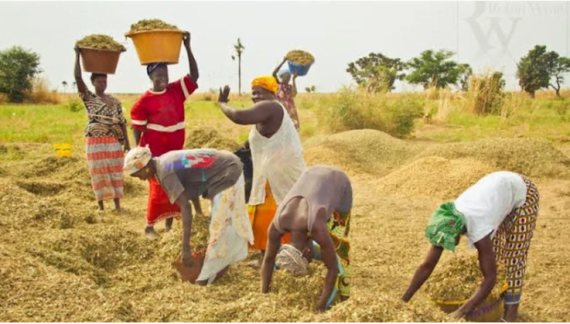The Rice Millers Association of Ghana (RMAG), Peasant Farmers Association of Ghana (PFAG) and General Agricultural Workers Union (GAWU) have expressed disappointment in the government for indefinitely suspending the Benchmark Value Reduction Reversal Policy.
The suspension, according to a joint press release from the three associations, will render about 100, 000 workers in the rice value chain jobless if not reversed.
The benchmark value reduction policy, according to the statement, makes imported rice cheaper by 25%, thus contributing to the competitiveness of local rice on the market and stifling Ghana’s industrialisation agenda.
The Association of Ghana Industries, AGI and the Ghana Union of Traders Association, GUTA have been at extreme ends of the benchmark value reduction policy which was introduced in April 2019 in an effort by the government to boost revenue from the ports and reduce instances of smuggling.
RMAG in its joint statement with PFAG and GAWU noted that “the impact on rice millers in 2019 after the announcement in April 2019 was devastating because, by June 2019, prices of imported rice in Ghana went down by some 20% forcing local rice millers to take a 15% to 20% price hit and eroding all our margins that year”.
The statement further noted that “there was no respite for farmers and millers in the face of such economic impact, even after we approached the government to present our concerns about the imminent threat to our farms and rice mills”.
The news of the reversal of the benchmark value reduction policy thus came as good news for the RMAG and others, except that the reversal of the policy is yet to see the light of day.
After being postponed on two different occasions by the GRA, a letter from the presidency to the Ghana Revenue Authority suspended the reversal of the benchmark value reduction policy sine die.
RMAG and its partners say “an estimated number of 100,000 persons who are directly engaged in rice value chain activities stand the risk of losing their livelihoods if the benchmark discount policy reversal is not implemented as planned”.
RMAG also said government policies must be deliberate in building the capacity of local farmers to produce the 1million metric tonnes of rice required to make Ghana self-sufficient in rice production and create “over 500,000 jobs in the economy and save over about USD 500Million of foreign exchange annually”.
The Rice Millers Association of Ghana, the Peasant Farmers Association of Ghana and the General Agricultural Workers Union of Ghana, are thus calling on the Government “to implement its decision regarding the reversal of benchmark value discount policy, particularly for rice, to save the hundreds of thousands of jobs that remain under threat of collapse in the rice sector”.
Source: citinewsroom.com


